September 23rd, 2009 in News, Trends by Hans Hagedorn
Controlling Internet Content is a sensitive issue for all governments – democratic or non-democratic. However, the kind of censorship applied in China or Iran is a complex matter and should be discussed by other authors. This article gives a short overview of current activities in recognized democratic countries. It raises the question, if national regulation of the Net is appropriate at all.
German Federal Minister for Family Affairs, Ursula von der Leyen, recently caused a lot of protest from net activists. In an attempt to fight child pornography, she introduced a law that obliges Internet Service Providers (ISPs) to install „Stop-signs“ in front of corresponding websites. Her opponents criticize this plan, because of the stop-signs being technical insufficient (they can rather easily be circumvented through other DNS-Servers) and they just hide the problem instead of fighting it.
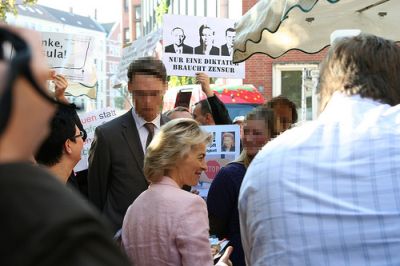
German Minister Ursula von der Leyen facing protests against her Internet filtering plans. by jan.gosmann, flickr.com, CC by US 2.0
This is just one example of how governments try to control the Internet. But not only the state, also ISPs have an interest in controlling content and Internet access. This article gives a short overview of different attempts.
The ideal of the Internet follows the principle of Net Neutrality, where all content is treated equal, resp. neutral, and can be accessed equally by everybody.
But reasons why governments and industries try to control the web are manifold:
# First, there are social and political reasons, like dealing with offensive content, hate speech, racism or terrorism. This affects content control, e.g through web filtering, content removal, URL blocking or the banning of search results.
# Secondly, there are economic reasons, affecting access control, e.g. ISPs offering higher bandwith for customers who pay higher rates. As well, ISPs could allow faster access to their own content than to the content of their competitors.
# Thirdly, there is the question of copyright protection.
USA
In the US, the political discussion focuses on controlling Internet access. President Barack Obama revived the debate about Network Neutrality in 2009 when he included it in the American Recovery and Reinvestment Act. The money provided by the state to foster broadband connection, 7,2 billion US-Dollars, should be used to “support the principles of network neutrality to preserve the benefits of open competition on the Internet.”
Nevertheless, this does say nothing about social control of the web. According to the OpenNet Initiative (ONI), an initiative monitoring Internet filtering all around the world, Web filtering in the USA relies mostly on content removal than on URL blocking. Most urges to remove content are by private action, not by the government. Internet users can also opt to install a filtering software on their computer, blocking the access to offensive content.
This filtering software is obligatory for public schools and libraries which want to get federal funding for Internet access.
Concerning copyright protection, the US follow the so called notice-and-takedown provision: As soon as an ISP is informed about a copyright violation, it has to remove this content from its service.
EUROPE
The European Union undertakes efforts to create a set of common policies and practices. Recently, the EU debates about the telecoms package which aims to unify the EUs telecom market for all member states. It is expected to become law in late 2009 or in 2010.
Especially France voted for adding a strict copyright protection law to prevent file sharing by cutting of file sharers internet access. This caused protest by European civil organisations and data protection activists. The European Parliament then amended the package once again, adding the abstract:
“(fb) applying the principle that no restriction may be imposed on the fundamental rights and freedoms of end-users, without a prior ruling by the judicial authorities, notably in accordance with Article 11 of the Charter of Fundamental Rights of the European Union on freedom of expression and information, save when public security is threatened in which case the ruling may be subsequent.” (see Wikipedia)
Net activists still fear that the telecoms package gives ISPs the right to limit Internet user’s access to websites and gives companies the right to privilege their content over other data, creating a “split internet”.
Web filtering in Europe
According to ONI reports, web filtering is rather the norm than the exception in most European countries. Filtered content includes child pornography – see the example of Germany in the beginning of this article – racism and hate speech. Some countries, like Norway and Great Britain attempt to also filter content that’s legal in real life, like gambling.
AUSTRALIA
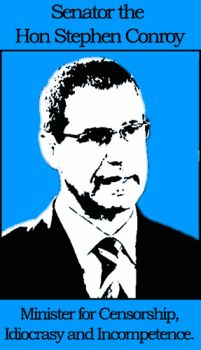
Mocking of Australian Minister Stephen Conroy. by lkalnk, flickr.com, CC by-nc-sa US 2.0
Australia implies one of the most restrictive Internet policies of Western nations, states the ONI report. Australia’s government set up an entity which can take down websites offering offensive content, the Australian Communications and Media Authority (ACMA). As soon as offensive content is found on websites hosted inside Australia, ACMA issues a take-down notice to the ISP, which then has to take this content down.
Furthermore, government promotes and finances an “opt-in” filtering programme: Users can voluntary accept filtering software that blocks offensive content of websites coming from outside the country.
Telecommunication Minister Stephen Conroy plans an even stricter Internet filtering programme: Basing on a blacklist of URLs, the websites on this blacklist should be blocked for all Australians. But recent trials showed that also non-offensive content was filtered accidentally, for example the website of an Australian dentist.
The planned Internet filtering is also criticised by ISPs that fear that the Internet performance could be hit.
Global action needed
While the European Union tries to harmonize the telecom market and sets up common laws for all member states, a global action to imply the principle of Net Neutrality is still missing. Participants of the World Information Summit and its follow-up, the Internet Governance Forum, pledge for a global entity to ensure a neutral Internet Governance.
But it also remains unclear, which institution should play the part of this neutral entity. Some researchers argue that ICANN is not neutral enough, after the association refused to accept an xxx-top level domain for pornographic content. So, who should be the global watchdog? Should it be ICANN nevertheless? Should it be a completely new institution?
by Simone Gerdesmeier, Hans Hagedorn, Zebralog
Add new tag, internet filtering, net neutrality, telecoms package, web filtering
August 31st, 2009 in Projects, Tools by Hans Hagedorn
Blogactiv.eu is a blog platform dedicated to European affairs. It was launched in 2008 and it is managed by EurActiv,
a European news network. With Blogactiv, the EurActiv-team wants to give Europeans the possibility to “better engage in online in the political debate on key European issues”.
Blogactiv allows an interested public to set up own weblogs and write about their views on the European Union and about European developments concerning their own countries. Additionally there is a weblog for guests who don´t want to set up own blogs, but who want to post articles nevertheless.
The aim as it is published on the website is pretty ambitious: “Blogactiv will become the premier source of content on the future of Europe.” This still seems a way to go:
It is planned to allow blogging in ten languages – but at the moment writing on the platform is restricted to English, French and German. The other languages (e.g. Polish, Romanian and even Turkish) are still waiting to be activated.
While the English and French sections feature quite recent posts, most of them coming from journalists, political analysts, interest groups and so on, the German section is rather empty, the latest entries coming from summer 2008.
by Simone Gerdesmeier, Zebralog Berlin
Weblog
August 26th, 2009 in Interview, Trends, Uncategorized by Hans Hagedorn
Expectation were high: The 2009 German Federal Election should be a real “online election” with big online campaigns, inspired by the success the Obama-campaign had had in 2008.
And indeed politicians like German chancellor Angela Merkel (CDU) or the counter-candidate Frank-Walter Steinmeier (SPD) do have their profiles in well-known social networks: You can find their profiles on Facebook as well as on the German social networks StudiVZ and MeinVZ. Candidates´ logos and websites resemble Barrack Obamas Websites with big pictures, videos and links to other online activities (see Merkel, Steinmeier).
But does it transferring the American campaign to the German Federal Elections really work?
Micah Sifri says: No!
Sifri founded the web-portal Personal Democracy and writes for the weblog Techpresident.com. In an interview with the German web-format “Elektrischer Reporter” he says that the main problem is that the German elections are status-quo-elections rather than change elections: “In a status-quo-election, where the candidates are not exciting, the internet won´t change that.” Only when there is a desire and a real chance for political change, volunteers who can exhaust the possibilities of the internet get more important.
According to Sifrin, Obama had understood the power of these volunteers and of voter generated activity and did not concentrate on one specific tool or one specific network, but on a combination of them all. (You can view the video-interview here: https://www.elektrischer-reporter.de/rohstoff/video/152/ . The audio is in English.)
Nevertheless some projects by civilians give an anticipation how a voter-driven activities online could look like in Germany. One of them is website “wechsel-waehler.de” (Wechselwähler meaning swing voter). Six swing voters moved in a shared flat where they will live until the elections. They blog about their political viewpoints and about recent news - and on each Sunday they have breakfast with a political guest. Videos of these Sunday roundtables can also be viewed on the website.
Simone Gerdesmeier, Zebralog Berlin
campaigns, elections
June 3rd, 2009 in Projects by Hans Hagedorn
The European Parliament will proclaim the United States of Europe? EU will grant basic financial security for all its citizens? After so many rejected referenda and strong suspicions against European politics, these ideas sound out of touch. However, they are just two examples from 16 solutions worked out by 361 citizens – randomly chosen in Germany – during a citizens’ dialogue about the EUs future.
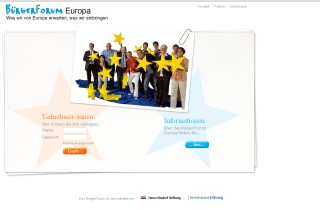
Special about these ideas is that they were not gathered in a quick opinion poll. Instead they are the result of a focused discussion, combining offline- and online debate, in which citizens tested and qualified their original opinions. What are the abilities of such an online dialogue and where are its limitations? European Elections will be held in June 2009. But voter’s attention started quite low: In February only 30% of the European citizens were sure that they want to cast their votes for a new European Parliament. 62% did not even know that the elections will be held. 361 citizens living in Germany proved themselves to be very interested in the European Elections and in the future of the EU. From January to April 2009 they participated in the BürgerForum Europa and discussed challenges and solutions for Europe.
German chancellor Merkel: “You are involved in something very exciting.”
The BürgerForum Europa has been initiated by the German Bertelsmann Foundation and Heinz Nixdorf Foundation. The organizers developed a combination of live events and online discussion. In February 2009 all participants met in Berlin to choose the topics for their debate. In the following two month of intense online debate they completed an agenda consisting of 16 solutions. In April 2009 the participants met again, this time in the old German parliament building in Bonn, and discussed their demands with five candidates for the European Parliament. This project-design was chosen to show new options for citizen participation. Instead of asking experts only, the organizers wanted to learn about citizens’ opinions, ideas and impulses, said Guther Thielen, chairman of the Bertelsmann Foundation.
The 361 participants, chosen at random, came from very diverse socio-cultural backgrounds and cover a wide range of professions, age, education – and opinions as well. The live event in Berlin got attention from high-ranking politicians: German chancellor Angela Merkel visited the participants and discussed Germany’s role in the European Union. “You are involved in something very exciting,” said Ms. Merkel. “I really welcome this initiative. We want the citizens to know something about the European Union and I think it’s very favourable that you do not only read about Europe, but work on your own ideas as well.”
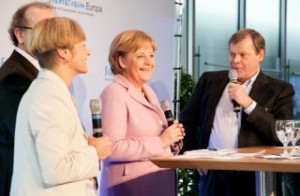
German chancellor Angela Merkel and participants of the BügerForum Europa
(Foto by Bernhard Link, Berlin)
An online platform for intense and focused debate
In Berlin, the citizens discussed first approaches for their agenda, framed challenges and thought about possible solutions. Challenges and solutions were transmitted to an online platform, where the participants completed their agenda in ten weeks of intense debate. They worked together in eight committees: constitution, institutions, European identity, social policy, resources and European law were some of the topics in question.
The online platform was planned and moderated by Zebralog. It is based on the software “discoursemachine 5” by Binary Objects. Contrary to classic online forums, the BürgerForum consists of special workflows which enable hundreds of people to work together efficiently. “Citizen Editors” assure the balance between contradictory opinions, votes and rankings condense comments to a concrete outcome, and moderators foster a balanced participation and a transparent process. These workflows base on Zebralogs long-time experience with online-dialogues.
Participation was unusually high compared to similar projects: 96% of the members wrote comments, 80% to 90% participated in the online votes and rankings. All in all about 10.000 comments were gathered during the online discussion, of which 7.355 regarded to the debate about the solutions.
Election Appeal
The online discussion is followed by a phase for more classical PR: organizers and participants share the task to promote the citizens’ agenda in the general public and to inform political executives. Amongst other things the online platform has been redesigned to enable a deliberation between thousands of people – with a minimum of human moderation. The original participants themselves guide through the online tool, so that users are welcomed by real people from the most diverse backgrounds. This brings an individual appeal to the discussion and adds authenticity to the process. Part of the online tool is also an election appeal.
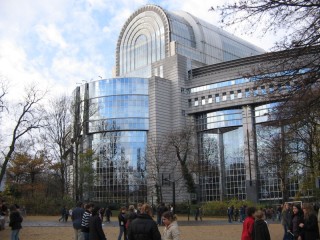
The European Parliament (wikimedia.org)
This citizen dialogue was already the second of its kind – a pilot project was carried out in 2008 with the “BürgerForum Soziale Marktwirtschaft”, a citizens’ dialogue about social market economy. The pilot projects methodical conclusions have been an important foundation for the recent project.
Accomplishments and limitations
Looking at the experience from a broader perspective, we can consider the following accomplishments and limitations:
Accomplishments:
- Political Activation!
The participants form their thoughts about the topics at hand in a very intense way. The effects probably exceed the results of other forms of political opinion building (e.g. through media consumption, discussions with the own social circle, taking part in polls etc).
- Balanced Participation!
The online platform enables citizens from very diverse backgrounds to work together in a way that neither overstrains nor underchallenges anybody. For this, it is necessary to design asynchronous workflows: Slow thinkers get the time they need, while fast thinkers can skip things as they please. Having said this, the process also has to be synchronous: Mutual decisions have to be made and result must be achieved within 10 weeks. All this can be done with participation quotas of 90% – however professional online-moderation is vital.
- Qualified Results! The platform allows hundreds of people to work together on normative texts and to achieve structural qualified results, similar to classic party programmes. Related web 2.0 tools are mostly restricted to descriptive texts (e.g. Wikipedia) in which false and true can be identified without doubt. The BürgerForums workflows proved to be more efficient to work on texts with valuations.
Current Limitations:
- Connection With Politics and Public?
The discussion process included high ranking politicians through all phases: The opening event in Berlin was visited by chancellor Merkel, MEPs took part in the online discussion, in Bonn the citizens discussed their ideas with candidates for the European Parliament. Still it is not clear which effects the participation process will have on political executives. Also the dispersion of the elaborated results in the general public does not equal the effects of a convincing PR campaign.
An important reason for that might be a tradition of the political daily routine: just a few politicians can imagine getting useful and valuable incitements through citizen participation. Same accounts for journalists and their audience. Considering the custom of producing results of citizen participation as “final results” or similar monolithic formats, these findings are not really astonishing.
For future projects it will be necessary to think about the delivery-formats right from the start. The results should be communicated in a way that is interesting and exploitable for the receiver.
- Mass-Participation?
While on the Internet, people count in thousands only. Projects that focus on “only” 350 participants might not be taken seriously enough. Even that these 350 participants went through a complex process of opinion forming might not really count. Will similar projects also work with hundred thousands of users? Experience gathered with the recent BürgerForum suggests that it might be possible – but that’s still a way to go.
- Excellent Results?
According to the concept of ‘collective intelligence’ the great achievements of a society depend largely on its ability to recombine the small achievements of individuals. As we say “The whole is more than the sum of its parts.” If true, this principle applies since the beginning of mankind and is nothing new. And every governance system is nothing else than a current method of combining and integrating smaller achievments. The additional interconnetivity through the means of the Internet offers – in a theoretical view – a large increase in collective intelligence. But this is just the theory and we need to solve the methodical problem: How can thousands of people work together on one question in a constructive way? Judging from the promising small experiences with the BürgerForum Europa, further development of the methods can be expected. This will help us to produce even more than just “good” collective results.
by Hans Hagedorn and Simone Gerdesmeier, zebralog.com
e-participation, European Union






